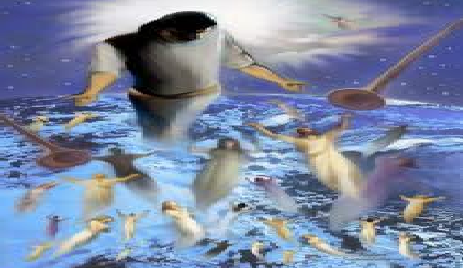Rapture Bible Prophecy Forum
(Rapture is a Vatican/Jesuit Lie )The "Resurrection" has been erroneously labeled The "Rapture".
THERE IS NO RAPTURE
WHY THE TITLE RAPTURE BIBLE PROPHECY FORUM?
WE STARTED OUT BELIEVING IN A 7 YR PRE TRIBULATION RAPTURE
BUT FOUND OVER TIME AROUND 2006 THAT THE BIBLE DOES NOT SHARE A
BIBLE VERSE WHATSOEVER INDICATING A 7 YR PRE TRIBULATION RAPTURE
BIBLE VERSES EVIDENCE:
While Yahusha/JESUS was alive, He prayed to His Father: "I pray not that thou shouldest take them out of the world, but that thou shouldest keep them from the evil. John 17:15 (KJV)
Yahusha/JESUS gave signs of what must happen before His Return: "Immediately after the tribulation of those days shall the sun be darkened, and the moon shall not give her light, and the stars shall fall from heaven, and the powers of the heavens shall be shaken:" Matt. 24:29 (KJV)
WE DAILY STUDY TO SHEW OURSELVES APPROVED
WE ARE NOT AFRAID TO SAY WE ARE LEARNING DAILY AND
ARE ABLE TO ADMIT WE MAKE MISTAKES BUT STUDY TO
LEARN EVERY DAY.
LET YHVH/YAHUSHA BE TRUE
AND EVERY MAN A LIAR.
To Join and post on this site e-mail for a password
stevensandiego@ymail.com
WEBSITE: HTTP://WWW.RAPTUREBIBLEPROPHECYFORUM.COM
FACEBOOK: https://www.facebook.com/pages/Rapture-Bible-Prophecy-Forum/362856490414697
Hebrew 5783-5788 Gregorian 2023-2028
THIS SITE IS ABOUT Yahusha/JESUS
We are followers of Yahusha/JESUS Only
Yahusha/JESUS IS GOD/YHVH
Yahusha/JESUS is YHVH/GOD/YHWH-Yahusha/Son:
Yahusha/JESUS is The WORD
Yahusha is I Am That I Am (Exodus 3:14)
Yahusha is YHWH come in the flesh, He put aside His Diety to become a human, born of a Virgin.
Yahusha is the Word, As The Most High, He spoke all things seen and unseen into existence
When YHWH created Light, He was revealed to the angels.
John 14:26
"the breath of life"
But the Comforter, which is "the breath of life", whom the Father will send shall teach you all things.
God is not His Name but a term. The Holy Spirit is not a person but the very Breath of the Father.
There is no Trinity. The Father, YHVH and Yahusha are One (John 10:30)
THE BOOK OF ENOCH
NOW IS THE TIME!
FOR A REMOTE GENERATION THE LAST GENERATION FOR THE ELECT!
REFERENCES IN THE BOOK OF ENOCH TO THE BIBLE
https://bookofenochreferences.wordpress.com/category/the-book-of-enoch-with-biblical-references-chapters-1-to-9/chapter-1/
Book of Enoch: http://tinyurl.com/BkOfEnoch
The book of Second Peter and Jude Authenticate the book of Enoch and Vice Versa
Yahusha/JESUS QUOTED FROM THE SEPTUAGINT:
THE APOSTLES QUOTED FROM THE SEPTUAGINT
JEWS WERE CONVERTING TO CHRISTIANITY
FREE DOWNLOADS
All Of The Apocryphal Books Of
The King James 1611 Version
http://www.scriptural-truth.com/apocrypha_books.html
Pray for one another, as we watch for the Lord's return!
